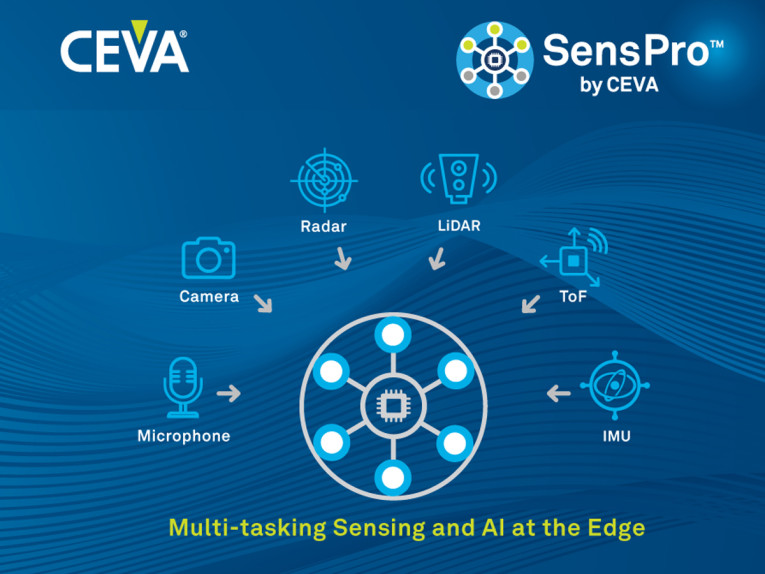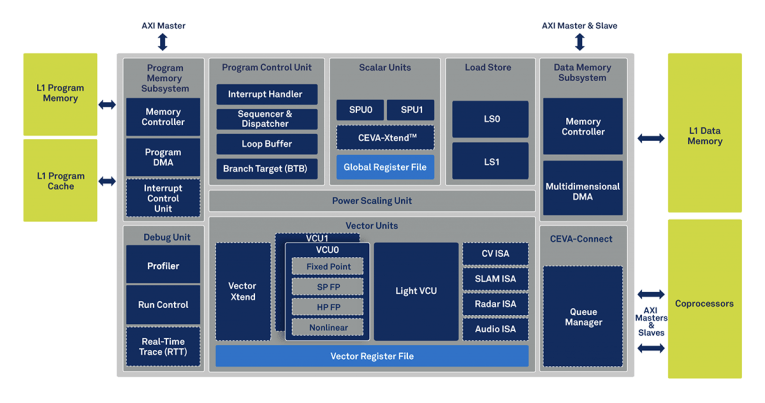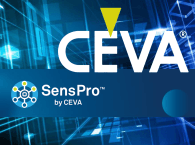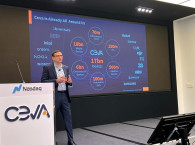
SensPro2 builds on CEVA’s industry leadership in sensor hub DSPs, delivering 6X more DSP processing for computer vision, 8X more DSP performance for Radar processing, a 2X improvement in AI inferencing, and 20% more power efficient versus its predecessor, at the same process node.
The SensPro2 family has been expanded to include seven vector DSP cores, scaling in power and performance. The new entry-level cores address DSP and AI workloads requiring up to 1 TOPS AI performance and the high-end cores reach 3.2 TOPS. Each of the SensPro2 family members can be configured with application-specific instruction set architectures (ISAs) for radar, audio, computer vision and SLAM, along with parallel vector compute options for floating point and integer data types, to get the highest efficiency sensor hub DSP for their specific use-case.
"Our new SensPro2 family of power-efficient sensor hub DSPs offers scalable performance, multiple precisions and high utilization for the increasingly complex and diverse AI/sensor workloads of contextually-aware devices," says Ran Snir, Vice President of R&D at CEVA. "The SensPro2 architecture is unique and innovative and uses a common ISA enabling seamless software reusability across all the SensPro2 DSPs. Our customers highly value this, along with the application-specific ISAs, as they increasingly utilize SensPro2 cores in their product designs."
The SensPro2 architecture adopts a range of enhancements that have increased the performance and boosted efficiency for multitasking sensing and AI use cases, such as a new low power vector DSP architecture. For automotive powertrain applications, the upgraded floating-point DSPs offer high-precision performance, addressing the electrification trend with a powerful processor. Moreover, the SensPro2 architecture and cores are automotive ready with ASIL B hardware random faults and ASIL D systematic fault certification. In terms of performance, SensPro2 is capable of delivering up to 3.2 TOPS for 8x8 networks inferencing running at 1.6GHz, and doubles the memory bandwidth from the 1st generation, to more efficiently address data-intensive fully-connected layers.

The 2nd generation SensPro DSP family consists of the SP100 and SP50 DSPs, with 128 and 64 INT8 MACS, respectively. These DSPs offer the smallest die size and deliver a 10X performance improvement for DeepSpeech2 speech recognition neural network, compared to the CEVA-BX2 scalar DSP, and are ideal for audio AI workloads, such as conversational assistants, sound analytics, and natural language processing (NLP).
The SP1000, SP500 and SP250 DSPs with 1024, 512, and 256 INT8 MACs, respectively, offer the highest performance and precision in the SensPro2 family, with optimal configurability for computer vision, SLAM, Radar, and AI workloads.
The SPF4 and SPF2 floating point DSPs, with 64 and 32 single precision floating point MACs, respectively, are optimized for electric vehicle powertrain control and battery management systems, complemented by a full suite of Eigen Linear Algebra, MATLAB vector libraries and support for Glow graph compiler.
SensPro2 DSPs are supported by a broad portfolio of software infrastructure to expedite system designs including an LLVM C/C++ compiler, Eclipse based integrated development environment (IDE), OpenVX API, software libraries for OpenCL, CEVA deep neural network (CDNN) graph compiler including the CDNN-Invite API for inclusion of custom AI engines, CEVA-CV imaging functions, CEVA-SLAM software development kit and vision libraries, Radar SDK, ClearVox noise reduction, WhisPro speech recognition, MotionEngine sensor fusion, Tensor Flow Lite Micro support, and the SenslinQ software framework.
The SensPro2 architecture and cores are available now for general licensing.
www.ceva-dsp.com





